Organisational Behaviour: Culture, Motivation, and Team Effectiveness
VerifiedAdded on 2023/01/19
|14
|4200
|99
Report
AI Summary
This report analyses organisational behaviour, focusing on how culture, politics, and power influence individual and team performance within Unilever. It evaluates content and process theories of motivation, such as Maslow's hierarchy of needs and Vroom's expectancy theory, and their impact on goal achievement. The report also distinguishes between effective and ineffective teams, highlighting the importance of communication and collaboration. Chantal's characteristics of political behaviour are also discussed in context of Unilever. The document provides insights into applying organisational behaviour concepts to improve team dynamics and overall organisational effectiveness. Desklib provides similar solved assignments and study resources for students.
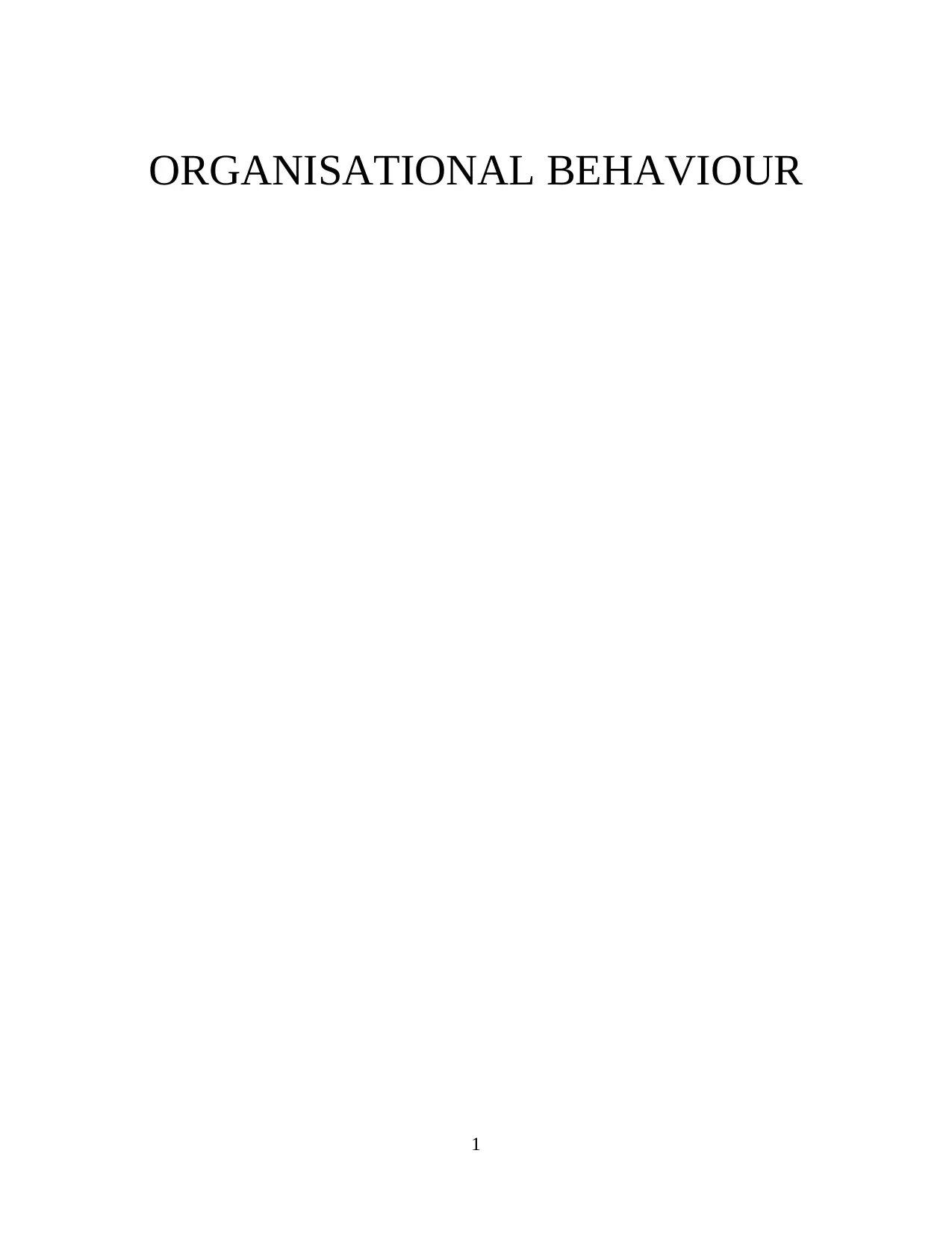
ORGANISATIONAL BEHAVIOUR
1
1
Paraphrase This Document
Need a fresh take? Get an instant paraphrase of this document with our AI Paraphraser
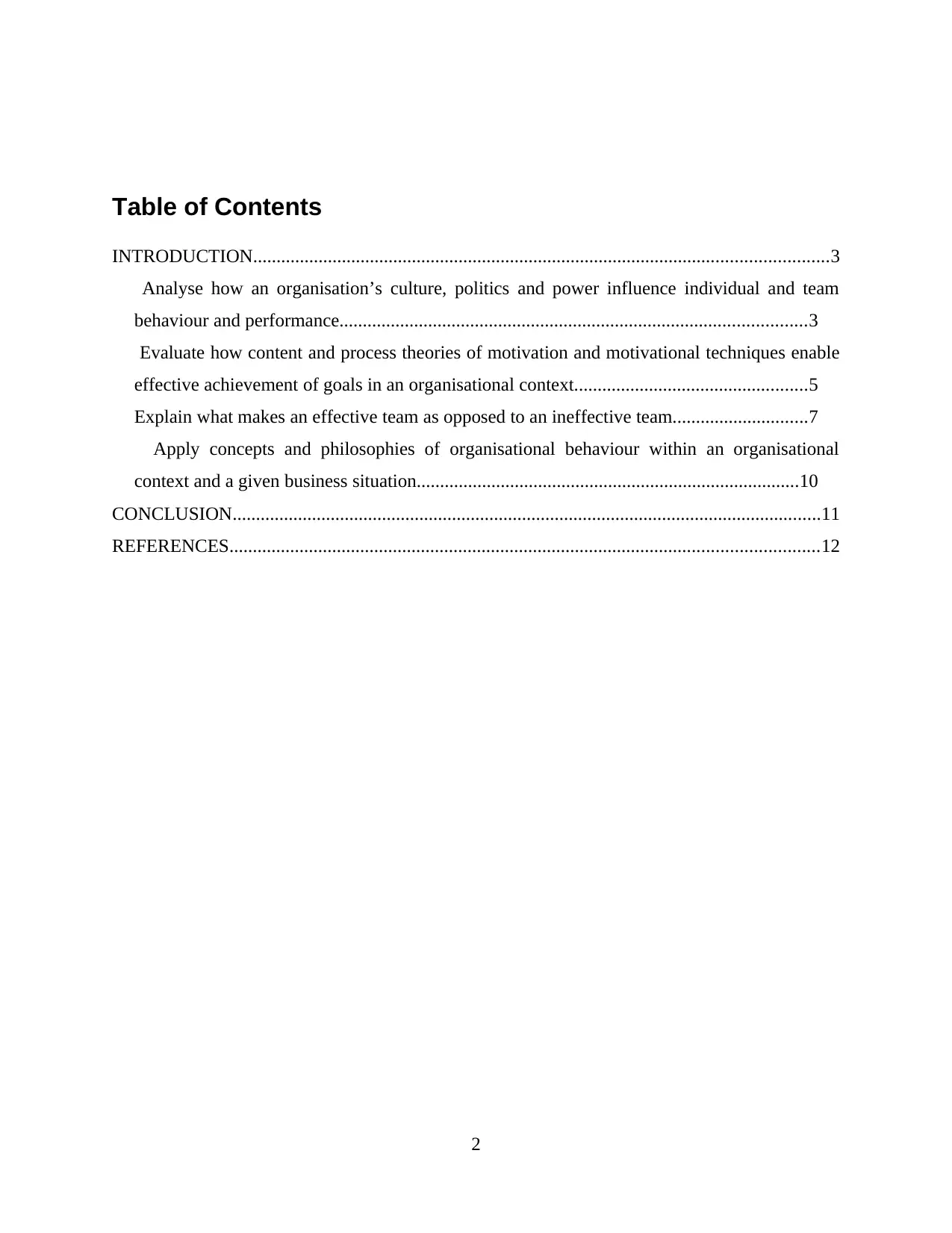
Table of Contents
INTRODUCTION...........................................................................................................................3
Analyse how an organisation’s culture, politics and power influence individual and team
behaviour and performance....................................................................................................3
Evaluate how content and process theories of motivation and motivational techniques enable
effective achievement of goals in an organisational context..................................................5
Explain what makes an effective team as opposed to an ineffective team.............................7
Apply concepts and philosophies of organisational behaviour within an organisational
context and a given business situation..................................................................................10
CONCLUSION..............................................................................................................................11
REFERENCES..............................................................................................................................12
2
INTRODUCTION...........................................................................................................................3
Analyse how an organisation’s culture, politics and power influence individual and team
behaviour and performance....................................................................................................3
Evaluate how content and process theories of motivation and motivational techniques enable
effective achievement of goals in an organisational context..................................................5
Explain what makes an effective team as opposed to an ineffective team.............................7
Apply concepts and philosophies of organisational behaviour within an organisational
context and a given business situation..................................................................................10
CONCLUSION..............................................................................................................................11
REFERENCES..............................................................................................................................12
2
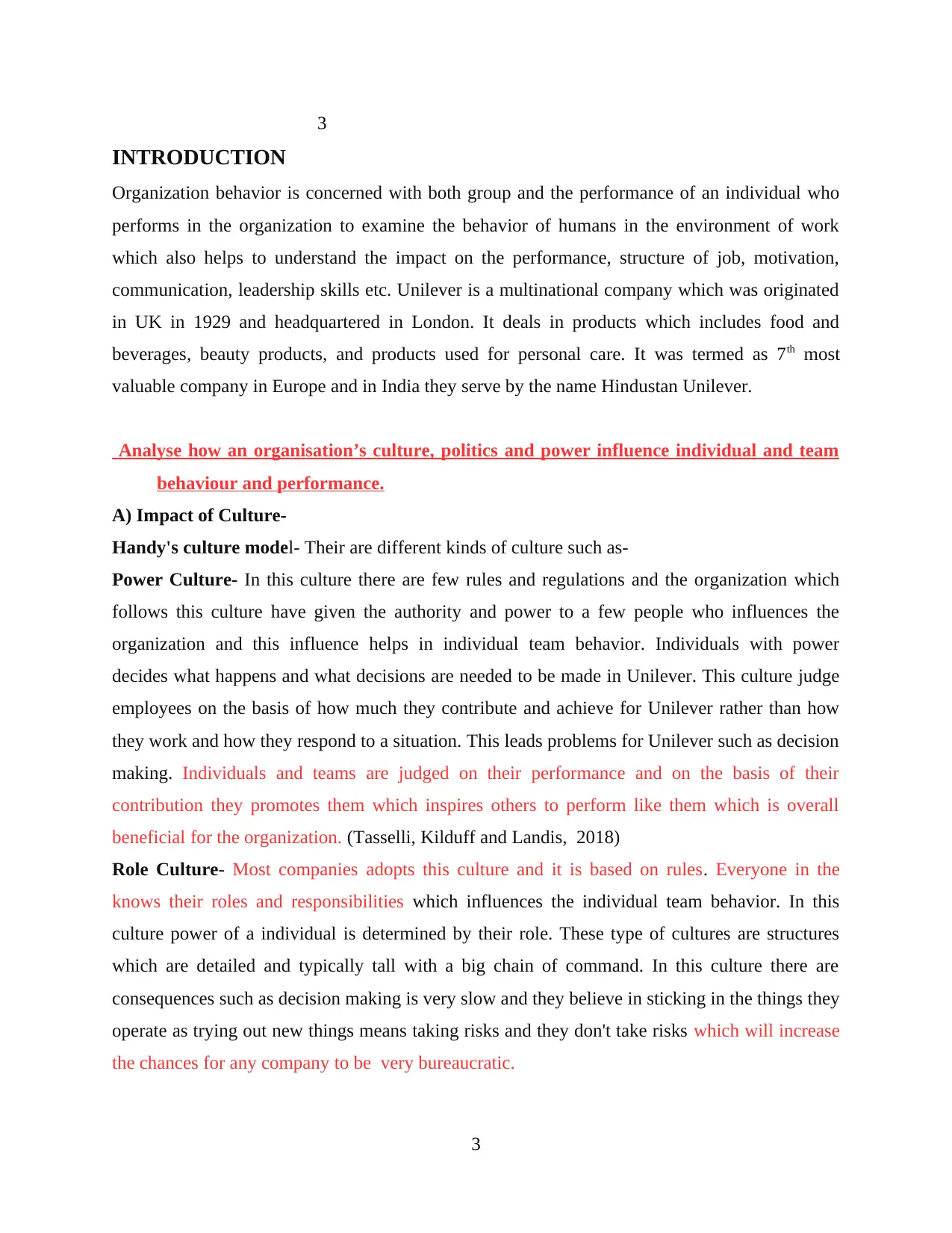
3
INTRODUCTION
Organization behavior is concerned with both group and the performance of an individual who
performs in the organization to examine the behavior of humans in the environment of work
which also helps to understand the impact on the performance, structure of job, motivation,
communication, leadership skills etc. Unilever is a multinational company which was originated
in UK in 1929 and headquartered in London. It deals in products which includes food and
beverages, beauty products, and products used for personal care. It was termed as 7th most
valuable company in Europe and in India they serve by the name Hindustan Unilever.
Analyse how an organisation’s culture, politics and power influence individual and team
behaviour and performance.
A) Impact of Culture-
Handy's culture model- Their are different kinds of culture such as-
Power Culture- In this culture there are few rules and regulations and the organization which
follows this culture have given the authority and power to a few people who influences the
organization and this influence helps in individual team behavior. Individuals with power
decides what happens and what decisions are needed to be made in Unilever. This culture judge
employees on the basis of how much they contribute and achieve for Unilever rather than how
they work and how they respond to a situation. This leads problems for Unilever such as decision
making. Individuals and teams are judged on their performance and on the basis of their
contribution they promotes them which inspires others to perform like them which is overall
beneficial for the organization. (Tasselli, Kilduff and Landis, 2018)
Role Culture- Most companies adopts this culture and it is based on rules. Everyone in the
knows their roles and responsibilities which influences the individual team behavior. In this
culture power of a individual is determined by their role. These type of cultures are structures
which are detailed and typically tall with a big chain of command. In this culture there are
consequences such as decision making is very slow and they believe in sticking in the things they
operate as trying out new things means taking risks and they don't take risks which will increase
the chances for any company to be very bureaucratic.
3
INTRODUCTION
Organization behavior is concerned with both group and the performance of an individual who
performs in the organization to examine the behavior of humans in the environment of work
which also helps to understand the impact on the performance, structure of job, motivation,
communication, leadership skills etc. Unilever is a multinational company which was originated
in UK in 1929 and headquartered in London. It deals in products which includes food and
beverages, beauty products, and products used for personal care. It was termed as 7th most
valuable company in Europe and in India they serve by the name Hindustan Unilever.
Analyse how an organisation’s culture, politics and power influence individual and team
behaviour and performance.
A) Impact of Culture-
Handy's culture model- Their are different kinds of culture such as-
Power Culture- In this culture there are few rules and regulations and the organization which
follows this culture have given the authority and power to a few people who influences the
organization and this influence helps in individual team behavior. Individuals with power
decides what happens and what decisions are needed to be made in Unilever. This culture judge
employees on the basis of how much they contribute and achieve for Unilever rather than how
they work and how they respond to a situation. This leads problems for Unilever such as decision
making. Individuals and teams are judged on their performance and on the basis of their
contribution they promotes them which inspires others to perform like them which is overall
beneficial for the organization. (Tasselli, Kilduff and Landis, 2018)
Role Culture- Most companies adopts this culture and it is based on rules. Everyone in the
knows their roles and responsibilities which influences the individual team behavior. In this
culture power of a individual is determined by their role. These type of cultures are structures
which are detailed and typically tall with a big chain of command. In this culture there are
consequences such as decision making is very slow and they believe in sticking in the things they
operate as trying out new things means taking risks and they don't take risks which will increase
the chances for any company to be very bureaucratic.
3
⊘ This is a preview!⊘
Do you want full access?
Subscribe today to unlock all pages.

Trusted by 1+ million students worldwide
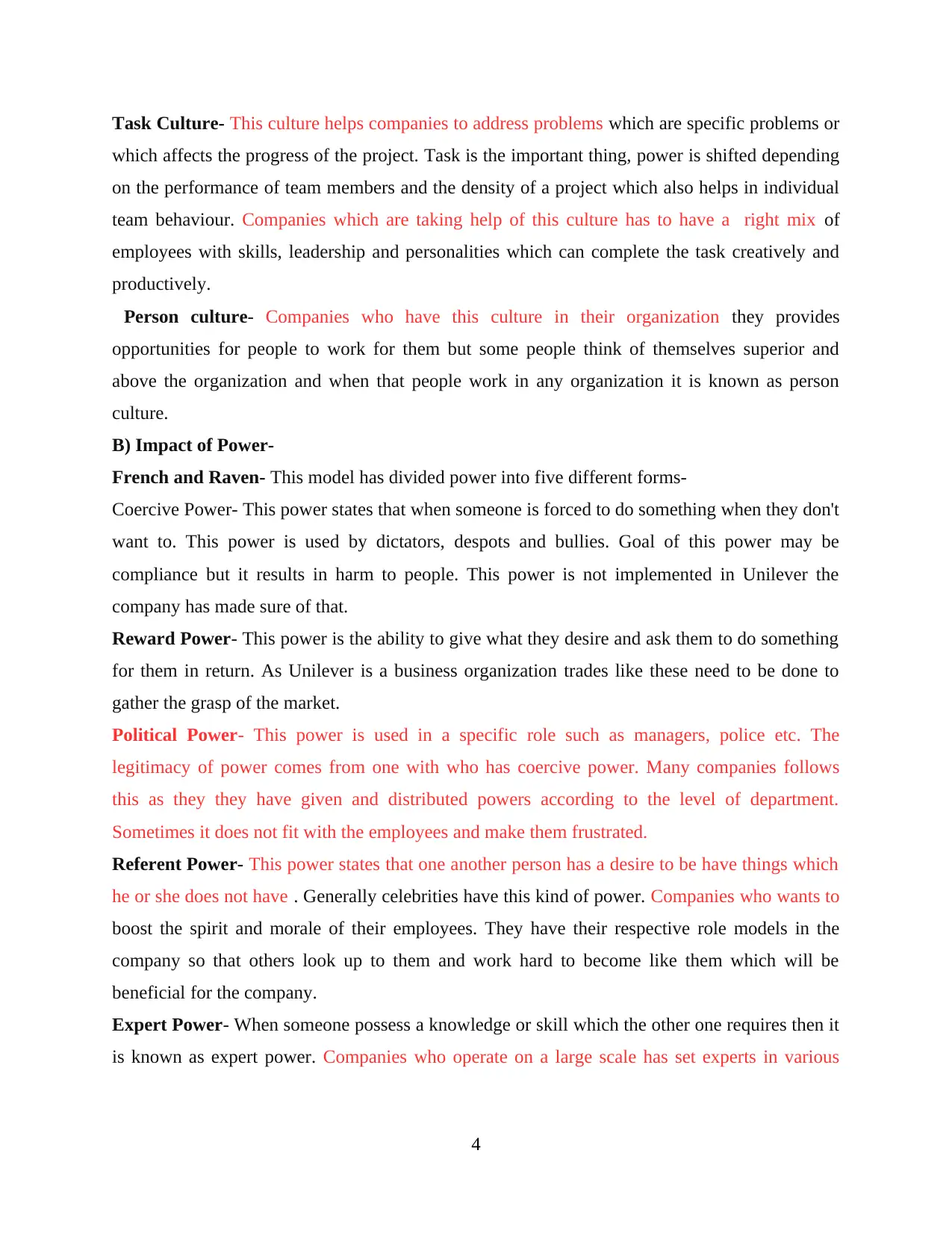
Task Culture- This culture helps companies to address problems which are specific problems or
which affects the progress of the project. Task is the important thing, power is shifted depending
on the performance of team members and the density of a project which also helps in individual
team behaviour. Companies which are taking help of this culture has to have a right mix of
employees with skills, leadership and personalities which can complete the task creatively and
productively.
Person culture- Companies who have this culture in their organization they provides
opportunities for people to work for them but some people think of themselves superior and
above the organization and when that people work in any organization it is known as person
culture.
B) Impact of Power-
French and Raven- This model has divided power into five different forms-
Coercive Power- This power states that when someone is forced to do something when they don't
want to. This power is used by dictators, despots and bullies. Goal of this power may be
compliance but it results in harm to people. This power is not implemented in Unilever the
company has made sure of that.
Reward Power- This power is the ability to give what they desire and ask them to do something
for them in return. As Unilever is a business organization trades like these need to be done to
gather the grasp of the market.
Political Power- This power is used in a specific role such as managers, police etc. The
legitimacy of power comes from one with who has coercive power. Many companies follows
this as they they have given and distributed powers according to the level of department.
Sometimes it does not fit with the employees and make them frustrated.
Referent Power- This power states that one another person has a desire to be have things which
he or she does not have . Generally celebrities have this kind of power. Companies who wants to
boost the spirit and morale of their employees. They have their respective role models in the
company so that others look up to them and work hard to become like them which will be
beneficial for the company.
Expert Power- When someone possess a knowledge or skill which the other one requires then it
is known as expert power. Companies who operate on a large scale has set experts in various
4
which affects the progress of the project. Task is the important thing, power is shifted depending
on the performance of team members and the density of a project which also helps in individual
team behaviour. Companies which are taking help of this culture has to have a right mix of
employees with skills, leadership and personalities which can complete the task creatively and
productively.
Person culture- Companies who have this culture in their organization they provides
opportunities for people to work for them but some people think of themselves superior and
above the organization and when that people work in any organization it is known as person
culture.
B) Impact of Power-
French and Raven- This model has divided power into five different forms-
Coercive Power- This power states that when someone is forced to do something when they don't
want to. This power is used by dictators, despots and bullies. Goal of this power may be
compliance but it results in harm to people. This power is not implemented in Unilever the
company has made sure of that.
Reward Power- This power is the ability to give what they desire and ask them to do something
for them in return. As Unilever is a business organization trades like these need to be done to
gather the grasp of the market.
Political Power- This power is used in a specific role such as managers, police etc. The
legitimacy of power comes from one with who has coercive power. Many companies follows
this as they they have given and distributed powers according to the level of department.
Sometimes it does not fit with the employees and make them frustrated.
Referent Power- This power states that one another person has a desire to be have things which
he or she does not have . Generally celebrities have this kind of power. Companies who wants to
boost the spirit and morale of their employees. They have their respective role models in the
company so that others look up to them and work hard to become like them which will be
beneficial for the company.
Expert Power- When someone possess a knowledge or skill which the other one requires then it
is known as expert power. Companies who operate on a large scale has set experts in various
4
Paraphrase This Document
Need a fresh take? Get an instant paraphrase of this document with our AI Paraphraser
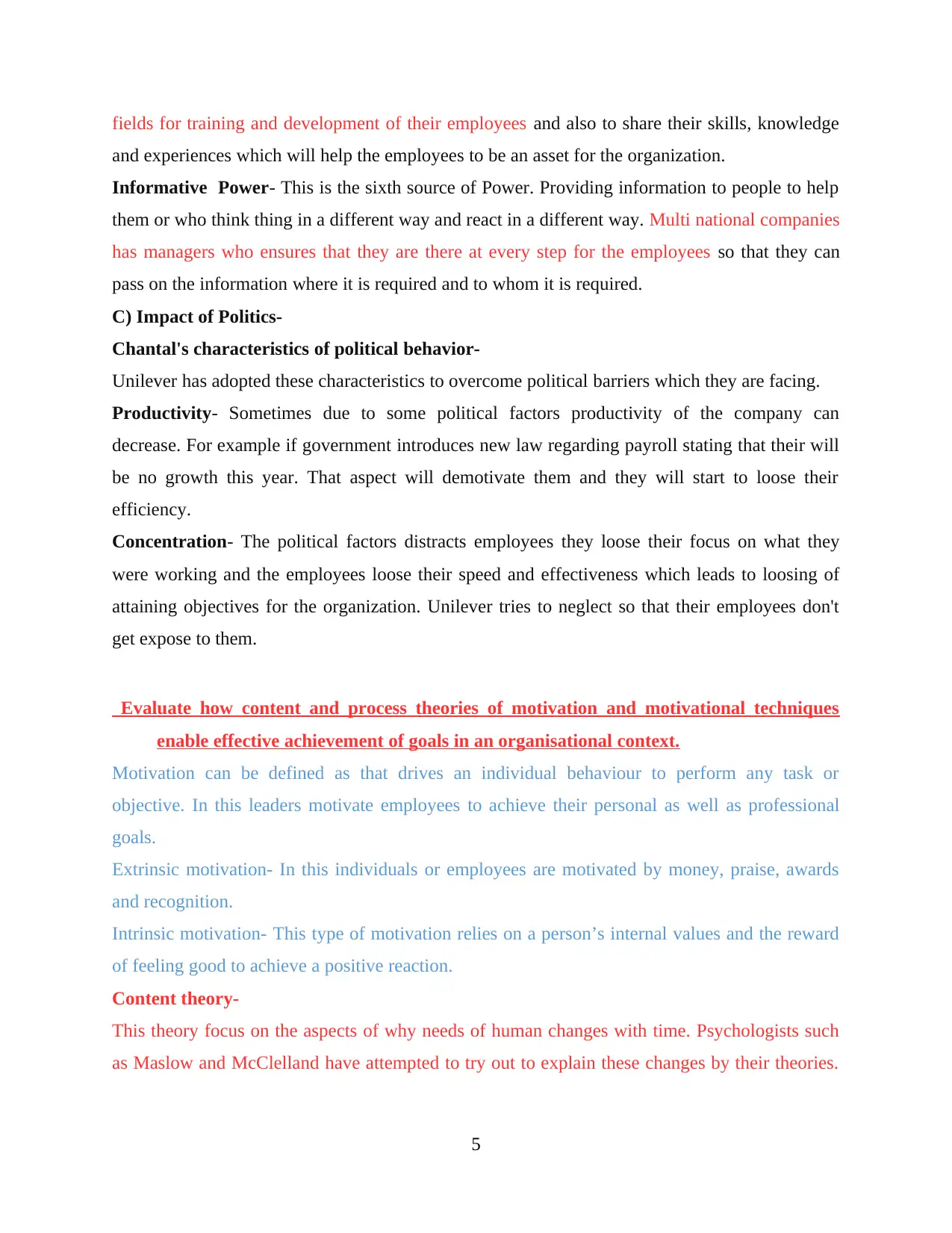
fields for training and development of their employees and also to share their skills, knowledge
and experiences which will help the employees to be an asset for the organization.
Informative Power- This is the sixth source of Power. Providing information to people to help
them or who think thing in a different way and react in a different way. Multi national companies
has managers who ensures that they are there at every step for the employees so that they can
pass on the information where it is required and to whom it is required.
C) Impact of Politics-
Chantal's characteristics of political behavior-
Unilever has adopted these characteristics to overcome political barriers which they are facing.
Productivity- Sometimes due to some political factors productivity of the company can
decrease. For example if government introduces new law regarding payroll stating that their will
be no growth this year. That aspect will demotivate them and they will start to loose their
efficiency.
Concentration- The political factors distracts employees they loose their focus on what they
were working and the employees loose their speed and effectiveness which leads to loosing of
attaining objectives for the organization. Unilever tries to neglect so that their employees don't
get expose to them.
Evaluate how content and process theories of motivation and motivational techniques
enable effective achievement of goals in an organisational context.
Motivation can be defined as that drives an individual behaviour to perform any task or
objective. In this leaders motivate employees to achieve their personal as well as professional
goals.
Extrinsic motivation- In this individuals or employees are motivated by money, praise, awards
and recognition.
Intrinsic motivation- This type of motivation relies on a person’s internal values and the reward
of feeling good to achieve a positive reaction.
Content theory-
This theory focus on the aspects of why needs of human changes with time. Psychologists such
as Maslow and McClelland have attempted to try out to explain these changes by their theories.
5
and experiences which will help the employees to be an asset for the organization.
Informative Power- This is the sixth source of Power. Providing information to people to help
them or who think thing in a different way and react in a different way. Multi national companies
has managers who ensures that they are there at every step for the employees so that they can
pass on the information where it is required and to whom it is required.
C) Impact of Politics-
Chantal's characteristics of political behavior-
Unilever has adopted these characteristics to overcome political barriers which they are facing.
Productivity- Sometimes due to some political factors productivity of the company can
decrease. For example if government introduces new law regarding payroll stating that their will
be no growth this year. That aspect will demotivate them and they will start to loose their
efficiency.
Concentration- The political factors distracts employees they loose their focus on what they
were working and the employees loose their speed and effectiveness which leads to loosing of
attaining objectives for the organization. Unilever tries to neglect so that their employees don't
get expose to them.
Evaluate how content and process theories of motivation and motivational techniques
enable effective achievement of goals in an organisational context.
Motivation can be defined as that drives an individual behaviour to perform any task or
objective. In this leaders motivate employees to achieve their personal as well as professional
goals.
Extrinsic motivation- In this individuals or employees are motivated by money, praise, awards
and recognition.
Intrinsic motivation- This type of motivation relies on a person’s internal values and the reward
of feeling good to achieve a positive reaction.
Content theory-
This theory focus on the aspects of why needs of human changes with time. Psychologists such
as Maslow and McClelland have attempted to try out to explain these changes by their theories.
5
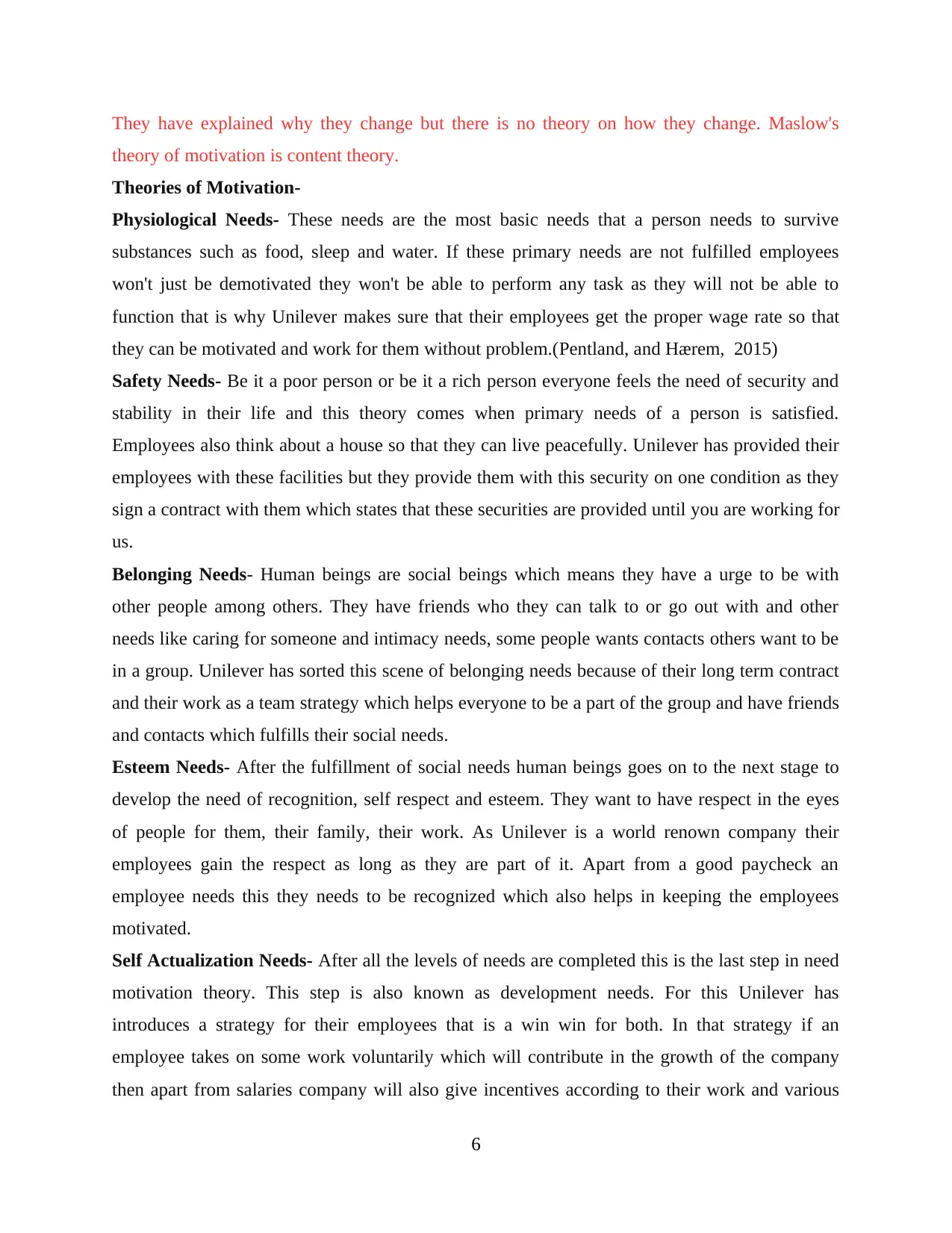
They have explained why they change but there is no theory on how they change. Maslow's
theory of motivation is content theory.
Theories of Motivation-
Physiological Needs- These needs are the most basic needs that a person needs to survive
substances such as food, sleep and water. If these primary needs are not fulfilled employees
won't just be demotivated they won't be able to perform any task as they will not be able to
function that is why Unilever makes sure that their employees get the proper wage rate so that
they can be motivated and work for them without problem.(Pentland, and Hærem, 2015)
Safety Needs- Be it a poor person or be it a rich person everyone feels the need of security and
stability in their life and this theory comes when primary needs of a person is satisfied.
Employees also think about a house so that they can live peacefully. Unilever has provided their
employees with these facilities but they provide them with this security on one condition as they
sign a contract with them which states that these securities are provided until you are working for
us.
Belonging Needs- Human beings are social beings which means they have a urge to be with
other people among others. They have friends who they can talk to or go out with and other
needs like caring for someone and intimacy needs, some people wants contacts others want to be
in a group. Unilever has sorted this scene of belonging needs because of their long term contract
and their work as a team strategy which helps everyone to be a part of the group and have friends
and contacts which fulfills their social needs.
Esteem Needs- After the fulfillment of social needs human beings goes on to the next stage to
develop the need of recognition, self respect and esteem. They want to have respect in the eyes
of people for them, their family, their work. As Unilever is a world renown company their
employees gain the respect as long as they are part of it. Apart from a good paycheck an
employee needs this they needs to be recognized which also helps in keeping the employees
motivated.
Self Actualization Needs- After all the levels of needs are completed this is the last step in need
motivation theory. This step is also known as development needs. For this Unilever has
introduces a strategy for their employees that is a win win for both. In that strategy if an
employee takes on some work voluntarily which will contribute in the growth of the company
then apart from salaries company will also give incentives according to their work and various
6
theory of motivation is content theory.
Theories of Motivation-
Physiological Needs- These needs are the most basic needs that a person needs to survive
substances such as food, sleep and water. If these primary needs are not fulfilled employees
won't just be demotivated they won't be able to perform any task as they will not be able to
function that is why Unilever makes sure that their employees get the proper wage rate so that
they can be motivated and work for them without problem.(Pentland, and Hærem, 2015)
Safety Needs- Be it a poor person or be it a rich person everyone feels the need of security and
stability in their life and this theory comes when primary needs of a person is satisfied.
Employees also think about a house so that they can live peacefully. Unilever has provided their
employees with these facilities but they provide them with this security on one condition as they
sign a contract with them which states that these securities are provided until you are working for
us.
Belonging Needs- Human beings are social beings which means they have a urge to be with
other people among others. They have friends who they can talk to or go out with and other
needs like caring for someone and intimacy needs, some people wants contacts others want to be
in a group. Unilever has sorted this scene of belonging needs because of their long term contract
and their work as a team strategy which helps everyone to be a part of the group and have friends
and contacts which fulfills their social needs.
Esteem Needs- After the fulfillment of social needs human beings goes on to the next stage to
develop the need of recognition, self respect and esteem. They want to have respect in the eyes
of people for them, their family, their work. As Unilever is a world renown company their
employees gain the respect as long as they are part of it. Apart from a good paycheck an
employee needs this they needs to be recognized which also helps in keeping the employees
motivated.
Self Actualization Needs- After all the levels of needs are completed this is the last step in need
motivation theory. This step is also known as development needs. For this Unilever has
introduces a strategy for their employees that is a win win for both. In that strategy if an
employee takes on some work voluntarily which will contribute in the growth of the company
then apart from salaries company will also give incentives according to their work and various
6
⊘ This is a preview!⊘
Do you want full access?
Subscribe today to unlock all pages.

Trusted by 1+ million students worldwide
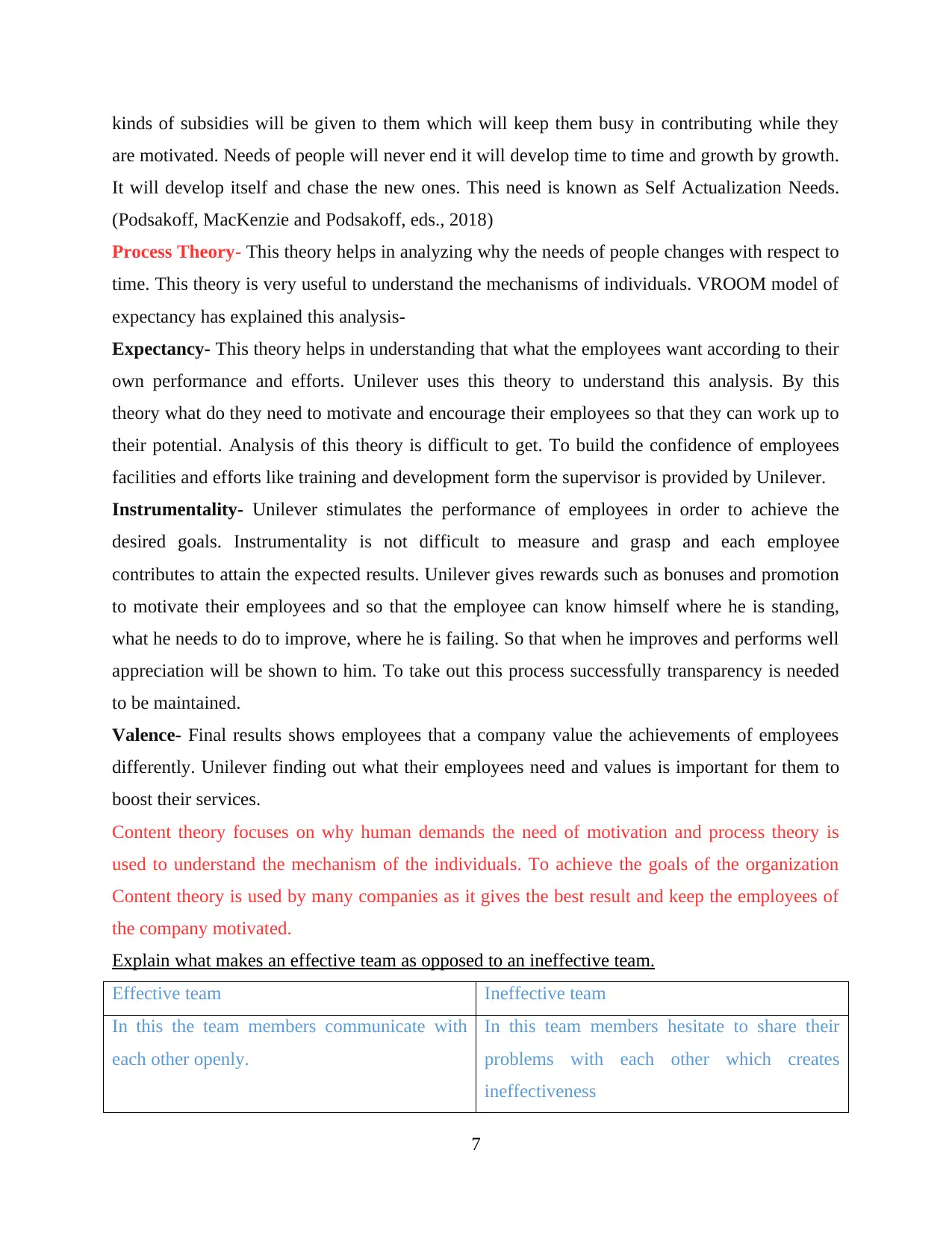
kinds of subsidies will be given to them which will keep them busy in contributing while they
are motivated. Needs of people will never end it will develop time to time and growth by growth.
It will develop itself and chase the new ones. This need is known as Self Actualization Needs.
(Podsakoff, MacKenzie and Podsakoff, eds., 2018)
Process Theory- This theory helps in analyzing why the needs of people changes with respect to
time. This theory is very useful to understand the mechanisms of individuals. VROOM model of
expectancy has explained this analysis-
Expectancy- This theory helps in understanding that what the employees want according to their
own performance and efforts. Unilever uses this theory to understand this analysis. By this
theory what do they need to motivate and encourage their employees so that they can work up to
their potential. Analysis of this theory is difficult to get. To build the confidence of employees
facilities and efforts like training and development form the supervisor is provided by Unilever.
Instrumentality- Unilever stimulates the performance of employees in order to achieve the
desired goals. Instrumentality is not difficult to measure and grasp and each employee
contributes to attain the expected results. Unilever gives rewards such as bonuses and promotion
to motivate their employees and so that the employee can know himself where he is standing,
what he needs to do to improve, where he is failing. So that when he improves and performs well
appreciation will be shown to him. To take out this process successfully transparency is needed
to be maintained.
Valence- Final results shows employees that a company value the achievements of employees
differently. Unilever finding out what their employees need and values is important for them to
boost their services.
Content theory focuses on why human demands the need of motivation and process theory is
used to understand the mechanism of the individuals. To achieve the goals of the organization
Content theory is used by many companies as it gives the best result and keep the employees of
the company motivated.
Explain what makes an effective team as opposed to an ineffective team.
Effective team Ineffective team
In this the team members communicate with
each other openly.
In this team members hesitate to share their
problems with each other which creates
ineffectiveness
7
are motivated. Needs of people will never end it will develop time to time and growth by growth.
It will develop itself and chase the new ones. This need is known as Self Actualization Needs.
(Podsakoff, MacKenzie and Podsakoff, eds., 2018)
Process Theory- This theory helps in analyzing why the needs of people changes with respect to
time. This theory is very useful to understand the mechanisms of individuals. VROOM model of
expectancy has explained this analysis-
Expectancy- This theory helps in understanding that what the employees want according to their
own performance and efforts. Unilever uses this theory to understand this analysis. By this
theory what do they need to motivate and encourage their employees so that they can work up to
their potential. Analysis of this theory is difficult to get. To build the confidence of employees
facilities and efforts like training and development form the supervisor is provided by Unilever.
Instrumentality- Unilever stimulates the performance of employees in order to achieve the
desired goals. Instrumentality is not difficult to measure and grasp and each employee
contributes to attain the expected results. Unilever gives rewards such as bonuses and promotion
to motivate their employees and so that the employee can know himself where he is standing,
what he needs to do to improve, where he is failing. So that when he improves and performs well
appreciation will be shown to him. To take out this process successfully transparency is needed
to be maintained.
Valence- Final results shows employees that a company value the achievements of employees
differently. Unilever finding out what their employees need and values is important for them to
boost their services.
Content theory focuses on why human demands the need of motivation and process theory is
used to understand the mechanism of the individuals. To achieve the goals of the organization
Content theory is used by many companies as it gives the best result and keep the employees of
the company motivated.
Explain what makes an effective team as opposed to an ineffective team.
Effective team Ineffective team
In this the team members communicate with
each other openly.
In this team members hesitate to share their
problems with each other which creates
ineffectiveness
7
Paraphrase This Document
Need a fresh take? Get an instant paraphrase of this document with our AI Paraphraser
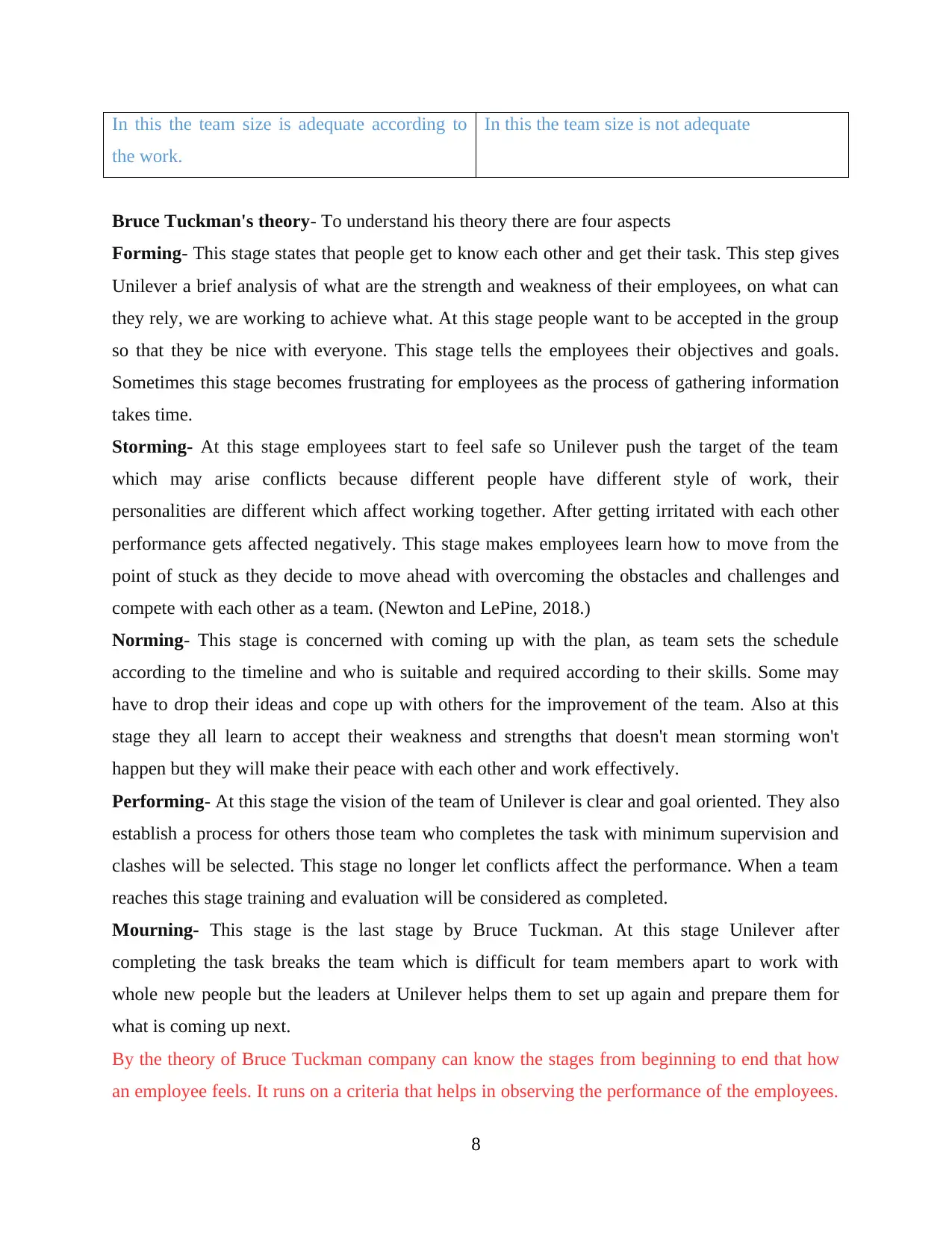
In this the team size is adequate according to
the work.
In this the team size is not adequate
Bruce Tuckman's theory- To understand his theory there are four aspects
Forming- This stage states that people get to know each other and get their task. This step gives
Unilever a brief analysis of what are the strength and weakness of their employees, on what can
they rely, we are working to achieve what. At this stage people want to be accepted in the group
so that they be nice with everyone. This stage tells the employees their objectives and goals.
Sometimes this stage becomes frustrating for employees as the process of gathering information
takes time.
Storming- At this stage employees start to feel safe so Unilever push the target of the team
which may arise conflicts because different people have different style of work, their
personalities are different which affect working together. After getting irritated with each other
performance gets affected negatively. This stage makes employees learn how to move from the
point of stuck as they decide to move ahead with overcoming the obstacles and challenges and
compete with each other as a team. (Newton and LePine, 2018.)
Norming- This stage is concerned with coming up with the plan, as team sets the schedule
according to the timeline and who is suitable and required according to their skills. Some may
have to drop their ideas and cope up with others for the improvement of the team. Also at this
stage they all learn to accept their weakness and strengths that doesn't mean storming won't
happen but they will make their peace with each other and work effectively.
Performing- At this stage the vision of the team of Unilever is clear and goal oriented. They also
establish a process for others those team who completes the task with minimum supervision and
clashes will be selected. This stage no longer let conflicts affect the performance. When a team
reaches this stage training and evaluation will be considered as completed.
Mourning- This stage is the last stage by Bruce Tuckman. At this stage Unilever after
completing the task breaks the team which is difficult for team members apart to work with
whole new people but the leaders at Unilever helps them to set up again and prepare them for
what is coming up next.
By the theory of Bruce Tuckman company can know the stages from beginning to end that how
an employee feels. It runs on a criteria that helps in observing the performance of the employees.
8
the work.
In this the team size is not adequate
Bruce Tuckman's theory- To understand his theory there are four aspects
Forming- This stage states that people get to know each other and get their task. This step gives
Unilever a brief analysis of what are the strength and weakness of their employees, on what can
they rely, we are working to achieve what. At this stage people want to be accepted in the group
so that they be nice with everyone. This stage tells the employees their objectives and goals.
Sometimes this stage becomes frustrating for employees as the process of gathering information
takes time.
Storming- At this stage employees start to feel safe so Unilever push the target of the team
which may arise conflicts because different people have different style of work, their
personalities are different which affect working together. After getting irritated with each other
performance gets affected negatively. This stage makes employees learn how to move from the
point of stuck as they decide to move ahead with overcoming the obstacles and challenges and
compete with each other as a team. (Newton and LePine, 2018.)
Norming- This stage is concerned with coming up with the plan, as team sets the schedule
according to the timeline and who is suitable and required according to their skills. Some may
have to drop their ideas and cope up with others for the improvement of the team. Also at this
stage they all learn to accept their weakness and strengths that doesn't mean storming won't
happen but they will make their peace with each other and work effectively.
Performing- At this stage the vision of the team of Unilever is clear and goal oriented. They also
establish a process for others those team who completes the task with minimum supervision and
clashes will be selected. This stage no longer let conflicts affect the performance. When a team
reaches this stage training and evaluation will be considered as completed.
Mourning- This stage is the last stage by Bruce Tuckman. At this stage Unilever after
completing the task breaks the team which is difficult for team members apart to work with
whole new people but the leaders at Unilever helps them to set up again and prepare them for
what is coming up next.
By the theory of Bruce Tuckman company can know the stages from beginning to end that how
an employee feels. It runs on a criteria that helps in observing the performance of the employees.
8
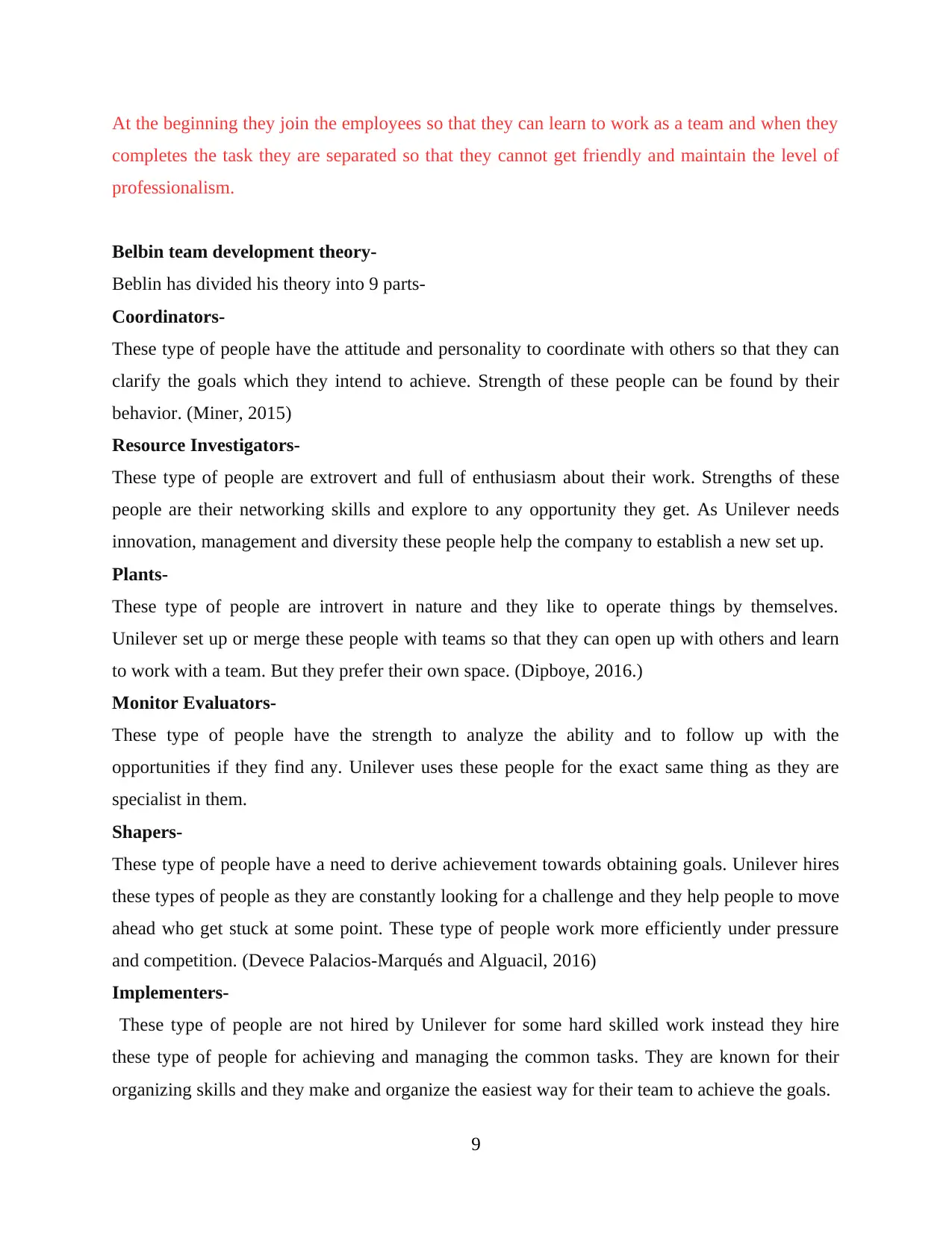
At the beginning they join the employees so that they can learn to work as a team and when they
completes the task they are separated so that they cannot get friendly and maintain the level of
professionalism.
Belbin team development theory-
Beblin has divided his theory into 9 parts-
Coordinators-
These type of people have the attitude and personality to coordinate with others so that they can
clarify the goals which they intend to achieve. Strength of these people can be found by their
behavior. (Miner, 2015)
Resource Investigators-
These type of people are extrovert and full of enthusiasm about their work. Strengths of these
people are their networking skills and explore to any opportunity they get. As Unilever needs
innovation, management and diversity these people help the company to establish a new set up.
Plants-
These type of people are introvert in nature and they like to operate things by themselves.
Unilever set up or merge these people with teams so that they can open up with others and learn
to work with a team. But they prefer their own space. (Dipboye, 2016.)
Monitor Evaluators-
These type of people have the strength to analyze the ability and to follow up with the
opportunities if they find any. Unilever uses these people for the exact same thing as they are
specialist in them.
Shapers-
These type of people have a need to derive achievement towards obtaining goals. Unilever hires
these types of people as they are constantly looking for a challenge and they help people to move
ahead who get stuck at some point. These type of people work more efficiently under pressure
and competition. (Devece Palacios-Marqués and Alguacil, 2016)
Implementers-
These type of people are not hired by Unilever for some hard skilled work instead they hire
these type of people for achieving and managing the common tasks. They are known for their
organizing skills and they make and organize the easiest way for their team to achieve the goals.
9
completes the task they are separated so that they cannot get friendly and maintain the level of
professionalism.
Belbin team development theory-
Beblin has divided his theory into 9 parts-
Coordinators-
These type of people have the attitude and personality to coordinate with others so that they can
clarify the goals which they intend to achieve. Strength of these people can be found by their
behavior. (Miner, 2015)
Resource Investigators-
These type of people are extrovert and full of enthusiasm about their work. Strengths of these
people are their networking skills and explore to any opportunity they get. As Unilever needs
innovation, management and diversity these people help the company to establish a new set up.
Plants-
These type of people are introvert in nature and they like to operate things by themselves.
Unilever set up or merge these people with teams so that they can open up with others and learn
to work with a team. But they prefer their own space. (Dipboye, 2016.)
Monitor Evaluators-
These type of people have the strength to analyze the ability and to follow up with the
opportunities if they find any. Unilever uses these people for the exact same thing as they are
specialist in them.
Shapers-
These type of people have a need to derive achievement towards obtaining goals. Unilever hires
these types of people as they are constantly looking for a challenge and they help people to move
ahead who get stuck at some point. These type of people work more efficiently under pressure
and competition. (Devece Palacios-Marqués and Alguacil, 2016)
Implementers-
These type of people are not hired by Unilever for some hard skilled work instead they hire
these type of people for achieving and managing the common tasks. They are known for their
organizing skills and they make and organize the easiest way for their team to achieve the goals.
9
⊘ This is a preview!⊘
Do you want full access?
Subscribe today to unlock all pages.

Trusted by 1+ million students worldwide
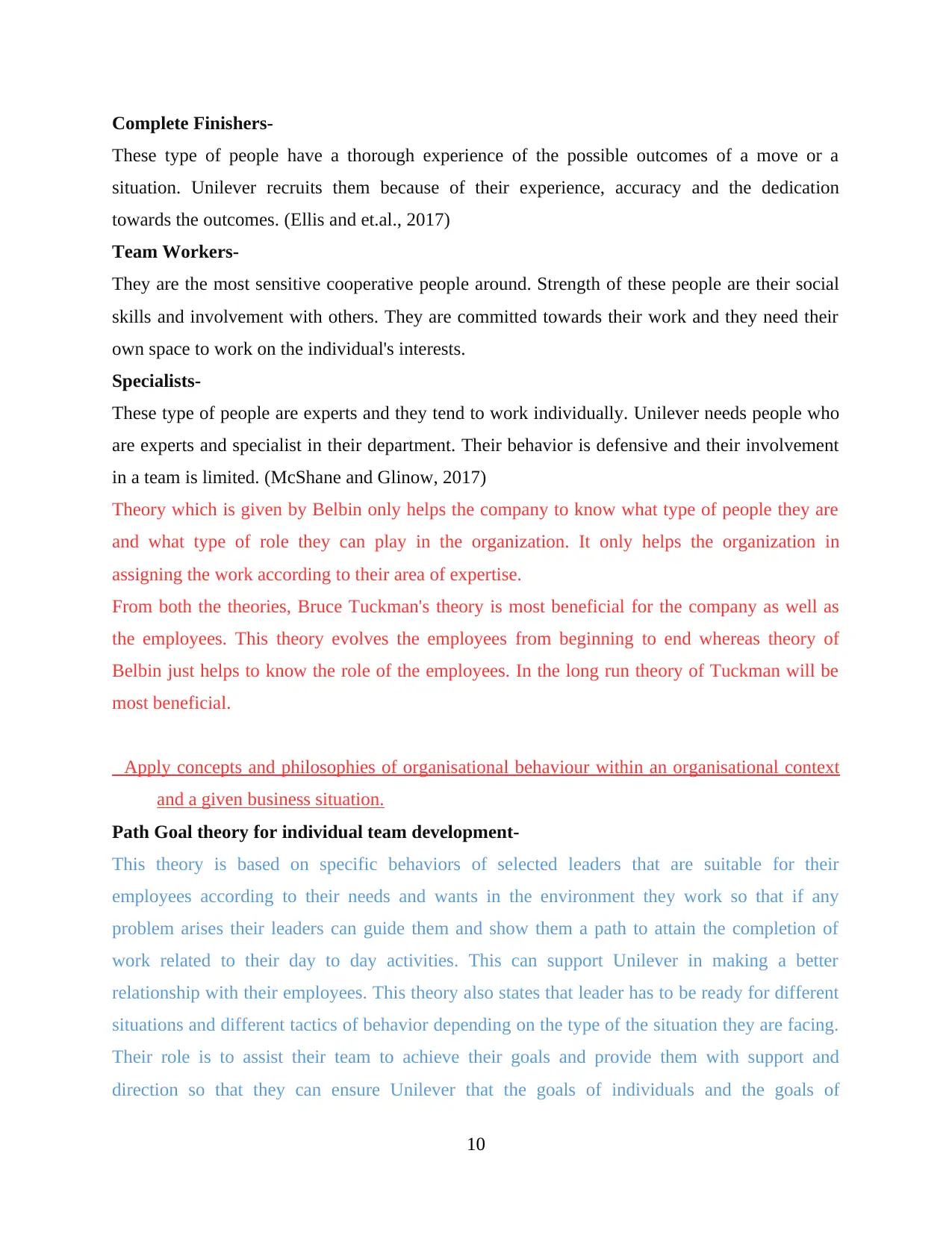
Complete Finishers-
These type of people have a thorough experience of the possible outcomes of a move or a
situation. Unilever recruits them because of their experience, accuracy and the dedication
towards the outcomes. (Ellis and et.al., 2017)
Team Workers-
They are the most sensitive cooperative people around. Strength of these people are their social
skills and involvement with others. They are committed towards their work and they need their
own space to work on the individual's interests.
Specialists-
These type of people are experts and they tend to work individually. Unilever needs people who
are experts and specialist in their department. Their behavior is defensive and their involvement
in a team is limited. (McShane and Glinow, 2017)
Theory which is given by Belbin only helps the company to know what type of people they are
and what type of role they can play in the organization. It only helps the organization in
assigning the work according to their area of expertise.
From both the theories, Bruce Tuckman's theory is most beneficial for the company as well as
the employees. This theory evolves the employees from beginning to end whereas theory of
Belbin just helps to know the role of the employees. In the long run theory of Tuckman will be
most beneficial.
Apply concepts and philosophies of organisational behaviour within an organisational context
and a given business situation.
Path Goal theory for individual team development-
This theory is based on specific behaviors of selected leaders that are suitable for their
employees according to their needs and wants in the environment they work so that if any
problem arises their leaders can guide them and show them a path to attain the completion of
work related to their day to day activities. This can support Unilever in making a better
relationship with their employees. This theory also states that leader has to be ready for different
situations and different tactics of behavior depending on the type of the situation they are facing.
Their role is to assist their team to achieve their goals and provide them with support and
direction so that they can ensure Unilever that the goals of individuals and the goals of
10
These type of people have a thorough experience of the possible outcomes of a move or a
situation. Unilever recruits them because of their experience, accuracy and the dedication
towards the outcomes. (Ellis and et.al., 2017)
Team Workers-
They are the most sensitive cooperative people around. Strength of these people are their social
skills and involvement with others. They are committed towards their work and they need their
own space to work on the individual's interests.
Specialists-
These type of people are experts and they tend to work individually. Unilever needs people who
are experts and specialist in their department. Their behavior is defensive and their involvement
in a team is limited. (McShane and Glinow, 2017)
Theory which is given by Belbin only helps the company to know what type of people they are
and what type of role they can play in the organization. It only helps the organization in
assigning the work according to their area of expertise.
From both the theories, Bruce Tuckman's theory is most beneficial for the company as well as
the employees. This theory evolves the employees from beginning to end whereas theory of
Belbin just helps to know the role of the employees. In the long run theory of Tuckman will be
most beneficial.
Apply concepts and philosophies of organisational behaviour within an organisational context
and a given business situation.
Path Goal theory for individual team development-
This theory is based on specific behaviors of selected leaders that are suitable for their
employees according to their needs and wants in the environment they work so that if any
problem arises their leaders can guide them and show them a path to attain the completion of
work related to their day to day activities. This can support Unilever in making a better
relationship with their employees. This theory also states that leader has to be ready for different
situations and different tactics of behavior depending on the type of the situation they are facing.
Their role is to assist their team to achieve their goals and provide them with support and
direction so that they can ensure Unilever that the goals of individuals and the goals of
10
Paraphrase This Document
Need a fresh take? Get an instant paraphrase of this document with our AI Paraphraser
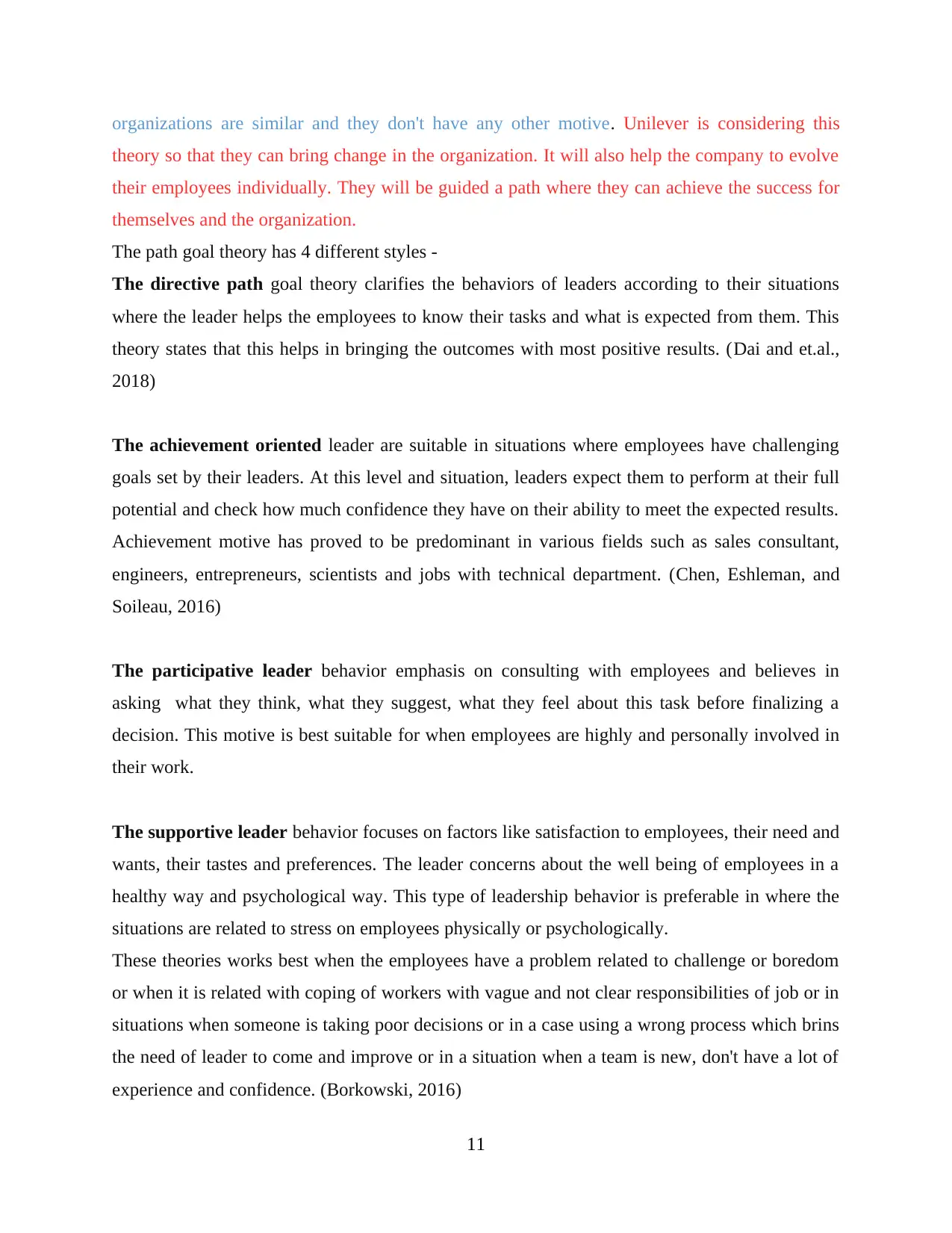
organizations are similar and they don't have any other motive. Unilever is considering this
theory so that they can bring change in the organization. It will also help the company to evolve
their employees individually. They will be guided a path where they can achieve the success for
themselves and the organization.
The path goal theory has 4 different styles -
The directive path goal theory clarifies the behaviors of leaders according to their situations
where the leader helps the employees to know their tasks and what is expected from them. This
theory states that this helps in bringing the outcomes with most positive results. (Dai and et.al.,
2018)
The achievement oriented leader are suitable in situations where employees have challenging
goals set by their leaders. At this level and situation, leaders expect them to perform at their full
potential and check how much confidence they have on their ability to meet the expected results.
Achievement motive has proved to be predominant in various fields such as sales consultant,
engineers, entrepreneurs, scientists and jobs with technical department. (Chen, Eshleman, and
Soileau, 2016)
The participative leader behavior emphasis on consulting with employees and believes in
asking what they think, what they suggest, what they feel about this task before finalizing a
decision. This motive is best suitable for when employees are highly and personally involved in
their work.
The supportive leader behavior focuses on factors like satisfaction to employees, their need and
wants, their tastes and preferences. The leader concerns about the well being of employees in a
healthy way and psychological way. This type of leadership behavior is preferable in where the
situations are related to stress on employees physically or psychologically.
These theories works best when the employees have a problem related to challenge or boredom
or when it is related with coping of workers with vague and not clear responsibilities of job or in
situations when someone is taking poor decisions or in a case using a wrong process which brins
the need of leader to come and improve or in a situation when a team is new, don't have a lot of
experience and confidence. (Borkowski, 2016)
11
theory so that they can bring change in the organization. It will also help the company to evolve
their employees individually. They will be guided a path where they can achieve the success for
themselves and the organization.
The path goal theory has 4 different styles -
The directive path goal theory clarifies the behaviors of leaders according to their situations
where the leader helps the employees to know their tasks and what is expected from them. This
theory states that this helps in bringing the outcomes with most positive results. (Dai and et.al.,
2018)
The achievement oriented leader are suitable in situations where employees have challenging
goals set by their leaders. At this level and situation, leaders expect them to perform at their full
potential and check how much confidence they have on their ability to meet the expected results.
Achievement motive has proved to be predominant in various fields such as sales consultant,
engineers, entrepreneurs, scientists and jobs with technical department. (Chen, Eshleman, and
Soileau, 2016)
The participative leader behavior emphasis on consulting with employees and believes in
asking what they think, what they suggest, what they feel about this task before finalizing a
decision. This motive is best suitable for when employees are highly and personally involved in
their work.
The supportive leader behavior focuses on factors like satisfaction to employees, their need and
wants, their tastes and preferences. The leader concerns about the well being of employees in a
healthy way and psychological way. This type of leadership behavior is preferable in where the
situations are related to stress on employees physically or psychologically.
These theories works best when the employees have a problem related to challenge or boredom
or when it is related with coping of workers with vague and not clear responsibilities of job or in
situations when someone is taking poor decisions or in a case using a wrong process which brins
the need of leader to come and improve or in a situation when a team is new, don't have a lot of
experience and confidence. (Borkowski, 2016)
11
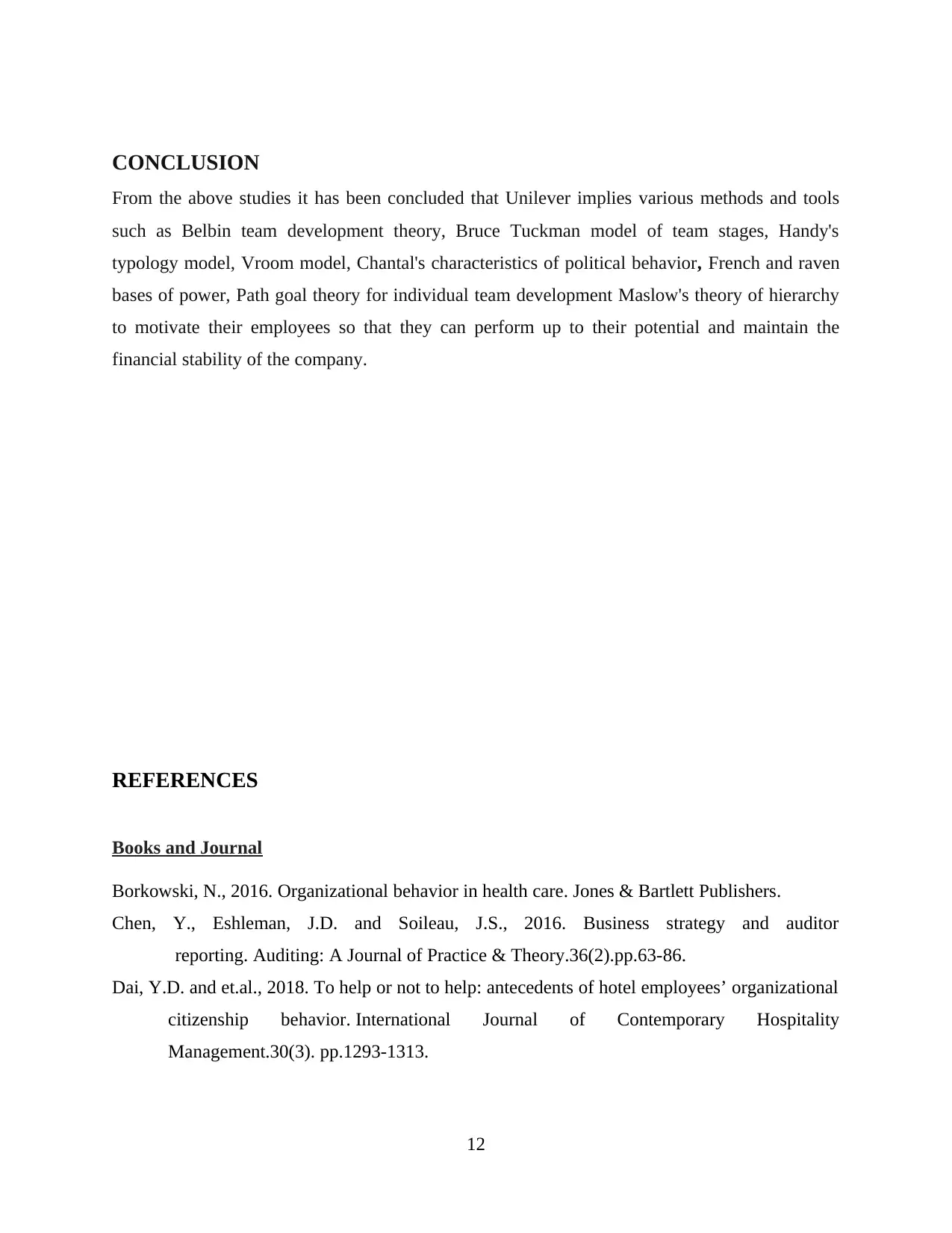
CONCLUSION
From the above studies it has been concluded that Unilever implies various methods and tools
such as Belbin team development theory, Bruce Tuckman model of team stages, Handy's
typology model, Vroom model, Chantal's characteristics of political behavior, French and raven
bases of power, Path goal theory for individual team development Maslow's theory of hierarchy
to motivate their employees so that they can perform up to their potential and maintain the
financial stability of the company.
REFERENCES
Books and Journal
Borkowski, N., 2016. Organizational behavior in health care. Jones & Bartlett Publishers.
Chen, Y., Eshleman, J.D. and Soileau, J.S., 2016. Business strategy and auditor
reporting. Auditing: A Journal of Practice & Theory.36(2).pp.63-86.
Dai, Y.D. and et.al., 2018. To help or not to help: antecedents of hotel employees’ organizational
citizenship behavior. International Journal of Contemporary Hospitality
Management.30(3). pp.1293-1313.
12
From the above studies it has been concluded that Unilever implies various methods and tools
such as Belbin team development theory, Bruce Tuckman model of team stages, Handy's
typology model, Vroom model, Chantal's characteristics of political behavior, French and raven
bases of power, Path goal theory for individual team development Maslow's theory of hierarchy
to motivate their employees so that they can perform up to their potential and maintain the
financial stability of the company.
REFERENCES
Books and Journal
Borkowski, N., 2016. Organizational behavior in health care. Jones & Bartlett Publishers.
Chen, Y., Eshleman, J.D. and Soileau, J.S., 2016. Business strategy and auditor
reporting. Auditing: A Journal of Practice & Theory.36(2).pp.63-86.
Dai, Y.D. and et.al., 2018. To help or not to help: antecedents of hotel employees’ organizational
citizenship behavior. International Journal of Contemporary Hospitality
Management.30(3). pp.1293-1313.
12
⊘ This is a preview!⊘
Do you want full access?
Subscribe today to unlock all pages.

Trusted by 1+ million students worldwide
1 out of 14
Related Documents
Your All-in-One AI-Powered Toolkit for Academic Success.
+13062052269
info@desklib.com
Available 24*7 on WhatsApp / Email
![[object Object]](/_next/static/media/star-bottom.7253800d.svg)
Unlock your academic potential
Copyright © 2020–2026 A2Z Services. All Rights Reserved. Developed and managed by ZUCOL.





